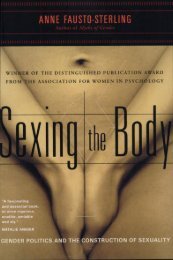C. Wiebes - Intelligence en de oorlog in Bosnië 1992-1995. De rol van de inlichtingen- en veiligheidsdiensten - Engels
C. Wiebes - Intelligence en de oorlog in Bosnië 1992-1995. De rol van de inlichtingen- en veiligheidsdiensten - Engels
C. Wiebes - Intelligence en de oorlog in Bosnië 1992-1995. De rol van de inlichtingen- en veiligheidsdiensten - Engels
- No tags were found...
You also want an ePaper? Increase the reach of your titles
YUMPU automatically turns print PDFs into web optimized ePapers that Google loves.
43any <strong>in</strong>dication of action tak<strong>en</strong>. The immediate effect had be<strong>en</strong> to d<strong>en</strong>y Dallaire permission to conductthe proposed cordon and search. ‘They refused’, said Marchal, ‘because UNAMIR was <strong>de</strong>ployed un<strong>de</strong>ra Chapter VImandate, traditional peacekeep<strong>in</strong>g. New York argued that a cordon and search was anoff<strong>en</strong>sive operation for which permission would not be granted’. The Secretary-G<strong>en</strong>eral was out ofUNHeadquarters for much of January and was not to learn of the signal and recognise its significanceuntil three years later. New York withheld permission for a military operation to capture the weapons.Once the massacres had started, G<strong>en</strong>eral Dallaire had neither the resources nor the mandate to prev<strong>en</strong>tthe planned g<strong>en</strong>oci<strong>de</strong>. 166 The advisor to the Secretary-G<strong>en</strong>eral, Iqbal Riza, later expla<strong>in</strong>ed that this wasdue to a feel<strong>in</strong>g of ‘not Somalia aga<strong>in</strong>’ <strong>in</strong> New York, with which he referred to the fear <strong>in</strong> New Yorkthat peacekeepers would be killed. 167The UN attitu<strong>de</strong> towards active <strong>in</strong>tellig<strong>en</strong>ce gather<strong>in</strong>g <strong>in</strong> peacekeep<strong>in</strong>g operations can beun<strong>de</strong>rstood <strong>in</strong> the light of a long-stand<strong>in</strong>g anti-<strong>in</strong>tellig<strong>en</strong>ce culture, but nonetheless it can hardly beconsi<strong>de</strong>red responsible. The <strong>in</strong>creas<strong>in</strong>gly complexity of the situations <strong>in</strong> which peacekeepers have tooperate, such as <strong>in</strong>ternal conflicts <strong>in</strong> UN member states, means that there is actually a grow<strong>in</strong>g need for<strong>in</strong>tellig<strong>en</strong>ce. The author David Charters states <strong>in</strong> no uncerta<strong>in</strong> terms that ‘<strong>in</strong>tellig<strong>en</strong>ce is c<strong>en</strong>tral to theeffectiv<strong>en</strong>ess of peacekeep<strong>in</strong>g <strong>in</strong> the new conflict <strong>en</strong>vironm<strong>en</strong>t’. 168 Van Kapp<strong>en</strong> is conv<strong>in</strong>ced that thelack of strategic <strong>in</strong>tellig<strong>en</strong>ce was an important cause of the failure of a number of UN operations. 169 Indo<strong>in</strong>g so, he raises a problem that the UN, as an <strong>in</strong>ternational organization, has so far be<strong>en</strong> unable tosolve <strong>in</strong> a structured way.The anarchic or almost anarchic situations which have created this <strong>in</strong>creas<strong>in</strong>g <strong>de</strong>mand for moreand better <strong>in</strong>tellig<strong>en</strong>ce are at the same time mak<strong>in</strong>g it more difficult to acquire and dissem<strong>in</strong>ate<strong>in</strong>tellig<strong>en</strong>ce. The rapidly chang<strong>in</strong>g situations and alliances on the ground are also <strong>en</strong>sur<strong>in</strong>g that<strong>in</strong>tellig<strong>en</strong>ce gathered by observers on the spot is rapidly out-of-date. Ev<strong>en</strong> the ‘old’ established<strong>in</strong>tellig<strong>en</strong>ce services have the greatest difficulty <strong>in</strong> keep<strong>in</strong>g up with these <strong>de</strong>velopm<strong>en</strong>ts. The UN musttherefore, accord<strong>in</strong>g to the author Hugh Smith, formulate a clear answer <strong>in</strong> the short term to thequestion of which <strong>rol</strong>e <strong>in</strong>tellig<strong>en</strong>ce should play <strong>in</strong> future peacekeep<strong>in</strong>g operations, and perhaps also <strong>in</strong>prev<strong>en</strong>tive diplomacy. After all, he argues, there happ<strong>en</strong>s to be a great need for strategic <strong>in</strong>tellig<strong>en</strong>ce <strong>in</strong>or<strong>de</strong>r to un<strong>de</strong>rstand the political and military situation betwe<strong>en</strong> the warr<strong>in</strong>g parties before the UNbecomes directly <strong>in</strong>volved. There is also a great <strong>de</strong>mand for operational <strong>in</strong>tellig<strong>en</strong>ce, which is nee<strong>de</strong>d to<strong>en</strong>sure the most effective <strong>de</strong>ploym<strong>en</strong>t of resources and manpower for the execution of the mandate.This is especially important with regard to issues that have a fairly fluid political or military context.F<strong>in</strong>ally, tactical <strong>in</strong>tellig<strong>en</strong>ce is necessary for the support of ground forces <strong>in</strong> perform<strong>in</strong>g theirpeacekeep<strong>in</strong>g tasks, such as monitor<strong>in</strong>g a ceasefire or a susp<strong>en</strong>sion of hostilities.170 The AmericanK<strong>en</strong>neth Allard, who carried out a study of the peacekeep<strong>in</strong>g operation <strong>in</strong> Somalia, also arrives at theconclusion that ‘<strong>in</strong>tellig<strong>en</strong>ce is as vital to the success of a peace operation as it is to any other militaryactivity’. 171The brief history of the relationship betwe<strong>en</strong> <strong>in</strong>tellig<strong>en</strong>ce and the UN outl<strong>in</strong>ed above shows itto be a relationship fraught with difficulties. In any case, it rapidly became clear to the Military<strong>Intellig<strong>en</strong>ce</strong> Service of the Royal Netherlands Army (MIS/Army) that they should expect noth<strong>in</strong>g ofthe UN. In 1995, the memorandum ‘<strong>Intellig<strong>en</strong>ce</strong> Needs of the M<strong>in</strong>istry of <strong>De</strong>f<strong>en</strong>ce’ rightly observedthat the lack of suffici<strong>en</strong>t security guarantees caused great reluctance among the countries that166 David A. Charters, ‘Out of the Closet: <strong>Intellig<strong>en</strong>ce</strong> Support for Post-Mo<strong>de</strong>rnist Peacekeep<strong>in</strong>g’, <strong>in</strong>: The Pearson Papers, no.4, <strong>Intellig<strong>en</strong>ce</strong> and Peacekeep<strong>in</strong>g, Halifax, 1999, p. 52. See also the docum<strong>en</strong>ts that were <strong>de</strong>classified on 20/08/01 on:http://www.gwu.edu.167 Halberstam, War <strong>in</strong> a Time of Peace, p. 275.168 David A. Charters, ‘Out of the Closet: <strong>Intellig<strong>en</strong>ce</strong> Support for Post-Mo<strong>de</strong>rnist Peacekeep<strong>in</strong>g’, The Pearson Papers, No. 4,<strong>Intellig<strong>en</strong>ce</strong> and Peacekeep<strong>in</strong>g, Halifax, 1999, p. 61.169 F.E. <strong>van</strong> Kapp<strong>en</strong>, ‘strategic <strong>in</strong>tellig<strong>en</strong>ce and the United Nations’, Militaire Spectator Vol. 170 (2001) 11, p. 594.170 Hugh Smith, ‘<strong>Intellig<strong>en</strong>ce</strong> and UN Peacekeep<strong>in</strong>g’, Survival, Vol. 36 (1994) 3, p. 175.171 Hartcock, The Peace Operations, p. 41.





